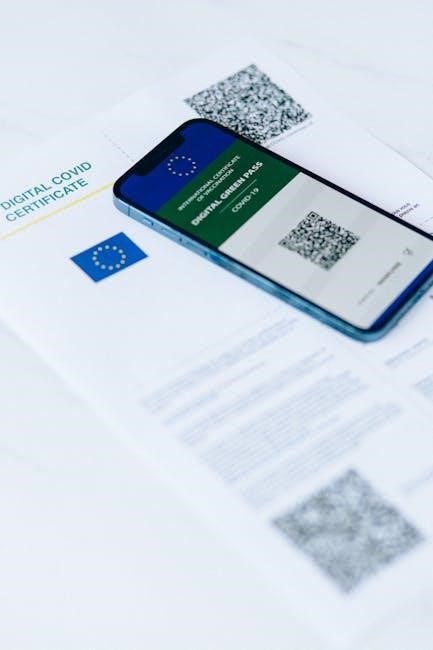The Smart Serve Test is essential for alcohol service certification in Ontario‚ ensuring responsible practices. It covers regulations‚ legal duties‚ and strategies for safe alcohol service.
Overview of the Smart Serve Program
The Smart Serve Program is a mandatory certification for individuals serving alcohol in Ontario. It focuses on promoting responsible alcohol service and reducing alcohol-related harm. The program equips servers with knowledge of Ontario’s alcohol laws‚ recognizing signs of intoxication‚ and strategies for refusing service safely. It also covers the Traffic Light System‚ a tool to assess a customer’s condition and determine if service is appropriate. The certification ensures that servers understand their legal responsibilities and the consequences of serving intoxicated patrons. By completing the program‚ individuals gain the skills to serve alcohol responsibly and contribute to a safer environment for both customers and establishments.
Importance of Smart Serve Certification in Ontario
Smart Serve certification is crucial for anyone serving alcohol in Ontario‚ as it ensures compliance with provincial laws and promotes responsible service practices. Servers are legally required to understand their responsibilities‚ including recognizing intoxication signs and knowing when to refuse service. Without certification‚ individuals and establishments may face legal consequences‚ such as fines or penalties. The program also equips servers with practical strategies to handle difficult situations‚ like refusing service to intoxicated patrons. By obtaining certification‚ servers demonstrate their commitment to public safety and professionalism‚ reducing risks for both customers and businesses. It is a key requirement for working in Ontario’s hospitality industry.

Understanding the Smart Serve Test Format
The Smart Serve Test consists of 40 multiple-choice questions. You have 60 minutes to complete it. Questions cover alcohol laws‚ signs of intoxication‚ and refusal techniques. The exam uses the Traffic Light System to assess intoxication levels. Practical scenarios evaluate your ability to handle real-life situations responsibly. Proper time management is crucial for success.
Structure of the Final Exam

The Smart Serve final exam consists of 40 multiple-choice questions designed to assess your understanding of responsible alcohol service. The exam is timed‚ allowing 60 minutes for completion. Questions are divided into key areas‚ including alcohol laws‚ recognizing intoxication‚ and refusal techniques. Each question provides four answer options‚ with only one correct choice. The exam also incorporates practical scenarios to evaluate your ability to apply knowledge in real-life situations. Proper time management is essential to ensure all questions are answered. A passing score requires answering at least 30 questions correctly. Scoring is immediate upon exam completion.
Types of Questions and Time Limits
The Smart Serve final exam features 40 multiple-choice questions‚ including true/false and scenario-based queries. You have 60 minutes to complete the test‚ with a passing score of 75%. Questions focus on alcohol service regulations‚ legal responsibilities‚ and recognizing intoxication. Scenario-based questions assess practical application of knowledge. Proper time management is crucial‚ as each question requires careful consideration; Allocate time to review answers before submission to ensure accuracy and completeness. Understanding the exam structure and question types helps in preparing effectively for the test. Practice with sample questions can enhance your readiness and confidence in managing the time limit effectively.

Key Topics Covered in the Smart Serve Test
The test covers alcohol service regulations‚ legal responsibilities‚ recognizing intoxication‚ and refusal of service. It also includes the Traffic Light System and time management strategies;

Alcohol Service Regulations in Ontario
Ontario’s alcohol service regulations‚ governed by the Liquor Licence Act‚ outline legal hours for selling alcohol‚ age restrictions‚ and prohibited practices. Servers must verify patrons’ ages‚ refuse service to intoxicated individuals‚ and adhere to specific licensing rules. Understanding these regulations is crucial for compliance and legal protection. The Smart Serve test ensures servers are well-versed in these laws‚ promoting a safe and responsible environment for both staff and customers. These regulations are consistently updated‚ making it essential to stay informed through reliable sources like the AGCO and official study materials.

Legal Responsibilities of Servers
Servers in Ontario have legal duties to prevent alcohol-related harm. They must refuse service to intoxicated patrons and ensure no alcohol is served to minors. If a server provides alcohol to an intoxicated individual‚ they may face liability. Understanding the Traffic Light System helps assess a patron’s sobriety. Servers are also required to intervene if a patron appears impaired‚ ensuring compliance with the Liquor Licence Act. These responsibilities emphasize the importance of vigilant service practices to maintain legal and ethical standards‚ protecting both the establishment and its patrons. Proper training‚ like Smart Serve‚ is vital for fulfilling these obligations effectively.
Recognizing Intoxication and Refusal of Service
Recognizing intoxication is critical for servers to prevent alcohol-related risks. Signs include slurred speech‚ unsteady movements‚ and aggressive behavior. The Traffic Light System categorizes patrons as green (sober)‚ yellow (moderately intoxicated)‚ or red (intoxicated). Servers must refuse service to red patrons and monitor yellows closely. Refusal should be polite but firm‚ offering water or food instead. Legal consequences arise if intoxicated patrons cause harm after being served. Proper training‚ like Smart Serve‚ teaches these skills to ensure compliance with Ontario’s liquor laws and promote a safe environment for everyone involved. Effective intervention helps protect both patrons and the establishment from potential liabilities.

Tips for Preparing for the Smart Serve Test
Use practice tests and study guides to familiarize yourself with exam format and content. Focus on understanding alcohol regulations‚ legal responsibilities‚ and the Traffic Light System.
Using Practice Tests and Study Guides
Utilize 2024-2025 Smart Serve practice tests and PDF guides to prepare effectively. Practice tests simulate real exam scenarios‚ helping you identify strengths and weaknesses. Study guides provide detailed explanations and correct answers‚ ensuring comprehension of key topics like alcohol regulations and legal responsibilities. Regularly reviewing these materials enhances familiarity with the test format and content‚ improving time management and confidence. They are valuable tools for mastering the Traffic Light System and understanding how to handle intoxication and refusal of service. By leveraging these resources‚ you can approach the exam with confidence and achieve success. Regular practice ensures readiness for the Smart Serve certification exam.
Strategies for Answering Multiple-Choice Questions
To excel in the Smart Serve Test‚ employ effective strategies for multiple-choice questions. Start by carefully reading each question and identifying key terms. Eliminate obviously incorrect answers to narrow down options. Use the process of elimination to increase the chances of selecting the right answer. Pay attention to keywords like “always‚” “never‚” or “except‚” which can signal the correct choice. If unsure‚ make an educated guess based on prior knowledge. Managing time effectively is crucial; allocate a set period for each question to avoid rushing. Practice with sample questions to build familiarity with the format and improve decision-making skills. This approach ensures confidence and accuracy during the exam.

Common Mistakes to Avoid During the Test
Avoid rushing through questions and misunderstanding the Traffic Light System. Ensure accurate answers by carefully reading each question and eliminating incorrect options before selecting a response.

Time Management and Question Skipping
Effective time management is crucial for success in the Smart Serve test. Allocate equal time to each question to avoid running out of time. If unsure of an answer‚ skip the question and return to it later. This strategy prevents wasting precious minutes and allows you to complete the test thoroughly. Practice tests can help improve pacing and identify areas needing more attention. By managing your time wisely‚ you can confidently address all questions within the allotted period‚ ensuring a higher likelihood of achieving a passing score. Proper time management is key to performing well on the exam.
Understanding the Traffic Light System
The Traffic Light System is a key tool in the Smart Serve program‚ helping servers assess a customer’s intoxication level. It categorizes patrons into three groups: Green (sober)‚ Yellow (moderately intoxicated)‚ and Red (severely intoxicated). Servers must recognize these signs to determine when to refuse service. Green indicates normal behavior‚ Yellow signals caution‚ and Red means service should be denied. This system aligns with legal responsibilities‚ ensuring servers act responsibly and avoid liability. Properly identifying these stages helps prevent alcohol-related harm and promotes a safer environment. Understanding and applying the Traffic Light System is vital for compliance with Ontario’s alcohol service regulations and for minimizing risks associated with over-serving alcohol.

Resources for Smart Serve Exam Preparation
Utilize PDF guides‚ practice tests‚ and online platforms to prepare effectively. These resources provide updated questions‚ answers‚ and study materials to help you excel in the Smart Serve exam.
Recommended Study Materials and PDF Guides
Access comprehensive PDF guides and practice tests for the Smart Serve exam; These materials include updated questions‚ answers‚ and detailed explanations to enhance your understanding. Utilize resources like the SMART SERVE Practice Test Questions With Answers (2024-2025 version)‚ which highlights correct answers in orange. Additionally‚ Quizlet flashcards cover key topics such as alcohol regulations and legal responsibilities. These study tools are designed to familiarize you with the exam format and strengthen your knowledge. By integrating these materials into your study routine‚ you can confidently prepare for the test and ensure success in becoming a certified server in Ontario.
Online Tools and Practice Platforms
Leverage online tools and practice platforms to excel in your Smart Serve preparation. Websites like Docsity offer comprehensive practice tests with updated questions and answers for 2024-2025. Quizlet provides flashcards to memorize key terms and concepts‚ such as alcohol regulations and legal responsibilities. Additionally‚ platforms feature real-life scenarios to test your decision-making skills. Many resources include time management tips and strategies for tackling multiple-choice questions. Utilizing these tools ensures you are well-prepared for the exam format and can confidently apply your knowledge in real-world situations. These platforms are designed to simulate the actual test experience‚ helping you identify strengths and areas for improvement.
Success in the Smart Serve Test requires thorough preparation‚ understanding of alcohol regulations‚ and effective strategies for responsible service. Utilize practice tests and study guides to ensure confidence and compliance.
Final Tips for Success in the Smart Serve Test
To excel in the Smart Serve Test‚ thoroughly review the Alcohol and Gaming Commission of Ontario (AGCO) regulations and practice with updated 2024-2025 PDF guides. Focus on understanding the Traffic Light System‚ recognizing intoxication signs‚ and legal responsibilities. Utilize online practice platforms to familiarize yourself with the exam format and time management. Reviewing real-life scenarios and seeking help when needed are crucial. Ensure you understand the permissible hours for alcohol service and the importance of not serving intoxicated individuals. Confidence and preparedness are key to achieving certification and ensuring responsible alcohol service in Ontario.
